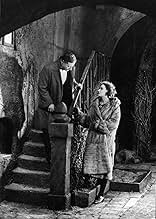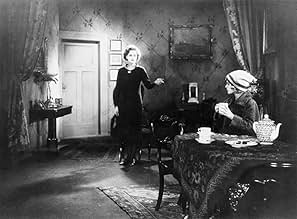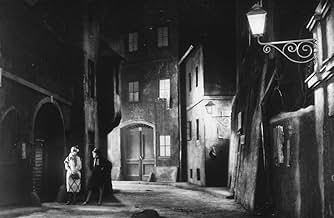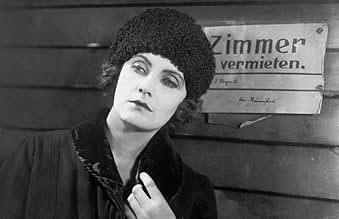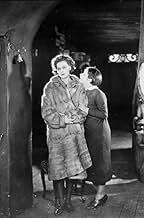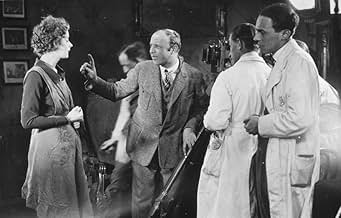Die freudlose Gasse
- 1925
- 2 घं 5 मि
IMDb रेटिंग
7.0/10
1.8 हज़ार
आपकी रेटिंग
अपनी भाषा में प्लॉट जोड़ेंIn post-WWI Vienna, Greta (Greta Garbo), her kid sister, and retired dad try to make it through tough times.In post-WWI Vienna, Greta (Greta Garbo), her kid sister, and retired dad try to make it through tough times.In post-WWI Vienna, Greta (Greta Garbo), her kid sister, and retired dad try to make it through tough times.
- निर्देशक
- लेखक
- स्टार
Ágnes Eszterházy
- Regina Rosenow
- (as Agnes Esterhazy)
Dorothea Thiele
- Lia Leid
- (as Tamara)
Renate Brausewetter
- Frau
- (बिना क्रेडिट के)
Mario Cusmich
- Oberst Irving
- (बिना क्रेडिट के)
Maria Forescu
- Frau
- (बिना क्रेडिट के)
Robert Garrison
- Don Alfonso Canez
- (बिना क्रेडिट के)
Valeska Gert
- Frau Greifer
- (बिना क्रेडिट के)
Max Kohlhase
- Marias Vater
- (बिना क्रेडिट के)
Krafft-Raschig
- Amerikanische Soldat
- (बिना क्रेडिट के)
फ़ीचर्ड समीक्षाएं
Although suspiciously short (I have viewed the truncated American release, at about an hour and a half long) Pabst's dour film is still fascinating to watch.
Young Greta (Greta Garbo) contemplates prostituting herself to save her family from starvation during WW1 Vienna.
Although woefully incomplete, Pabst is well-served by the best European silents cast. Werner Krauss is on lascivious best-form as the avaracious butcher. The great Danish actress Asta Nielsen might be improbable casting as the daughter of a middle-aged couple (she was 44 at the time), but exudes sympathy. There is also a lovely cameo from Valeska Gert as the coat-shop assistant, who tempts Garbo into buying a fur coat after stroking her face and body with it.
It's all eyes on Garbo however, who gives a soulful, world-weary intensity, shot in adoring close-up, as the troubled girl. Her transmission of feelings of angst and desperation are hard to compare in silent cinema and this ranks amongst her best ever. (Indeed, it was her favourite film).
There are improbable moments - Garbo as "Flaming Youth" doesnt work as she makes the most gawky flapper and Einar Hanson as the Yankee Lieutenant who saves her from despair is a hollywood happy ending out of kilter with 'The New Objectivity' that Pabst claimed to work under.
But his eye for a dank, semi-expressionistic Vienna is remarkable and the mobile camera he employs at several key moments (notably as it roves amongst the butcher's queue like an interrogating spot-light) are almost revelatory.
Young Greta (Greta Garbo) contemplates prostituting herself to save her family from starvation during WW1 Vienna.
Although woefully incomplete, Pabst is well-served by the best European silents cast. Werner Krauss is on lascivious best-form as the avaracious butcher. The great Danish actress Asta Nielsen might be improbable casting as the daughter of a middle-aged couple (she was 44 at the time), but exudes sympathy. There is also a lovely cameo from Valeska Gert as the coat-shop assistant, who tempts Garbo into buying a fur coat after stroking her face and body with it.
It's all eyes on Garbo however, who gives a soulful, world-weary intensity, shot in adoring close-up, as the troubled girl. Her transmission of feelings of angst and desperation are hard to compare in silent cinema and this ranks amongst her best ever. (Indeed, it was her favourite film).
There are improbable moments - Garbo as "Flaming Youth" doesnt work as she makes the most gawky flapper and Einar Hanson as the Yankee Lieutenant who saves her from despair is a hollywood happy ending out of kilter with 'The New Objectivity' that Pabst claimed to work under.
But his eye for a dank, semi-expressionistic Vienna is remarkable and the mobile camera he employs at several key moments (notably as it roves amongst the butcher's queue like an interrogating spot-light) are almost revelatory.
As an entry into Weimar life, well Vienna, Austria, but it must have spoken to and about both places equally after the war, this opens a window in a time of hyperinflation and scarcity. And this is what I was looking for, direct experience from within the world that gives rise to it, as something that was about life "now".
We see on one hand the controllers, from the butcher that people line up to buy his precious meat, to the war profiteer who's come to run a scheme on the stockmarket, to the madame of a private club who exploits innocent desperation. All of them lecherous cutouts - but no doubt cut from life. Meanwhile around them dance and mingle various crowds of those who still have.
And on the other side the hapless schmucks dangling on strings of this cruel world being manipulated from above, the poor family downstairs, the girl whose father loses everything when the market tumbles and she's forced to entertain in the club, the unemployed couple who must live in someone's barn. The fancy rooms are closed to them, the streets they know bleak and ugly.
It is all here in a sense, however much schematic. Being a silent, the visceral impression is of a nightmare and reverie, something you'd want to wake up from - and yet the presentation of reality, within silent limits of the era of course, we would call realist, not expressionist.
And this is seen in another way. One of the things that first stirred in the murk of Weimar was film noir, not the actual thing but its ghostly progenitors. Mabuse would posit a bleak world much like we see here, inspired from the same dazed hopelessness no doubt, but a devious mastermind was behind it, the product of dazed imagination. There are devious minds here, but all of them ordinary schemers.
There's clear sight in other words. It was still too early in Pabst's career however and for where I know him to have gone with characters and story much like these, this seems like a modest beginning, a ground floor for future ones to be built on top.
We see on one hand the controllers, from the butcher that people line up to buy his precious meat, to the war profiteer who's come to run a scheme on the stockmarket, to the madame of a private club who exploits innocent desperation. All of them lecherous cutouts - but no doubt cut from life. Meanwhile around them dance and mingle various crowds of those who still have.
And on the other side the hapless schmucks dangling on strings of this cruel world being manipulated from above, the poor family downstairs, the girl whose father loses everything when the market tumbles and she's forced to entertain in the club, the unemployed couple who must live in someone's barn. The fancy rooms are closed to them, the streets they know bleak and ugly.
It is all here in a sense, however much schematic. Being a silent, the visceral impression is of a nightmare and reverie, something you'd want to wake up from - and yet the presentation of reality, within silent limits of the era of course, we would call realist, not expressionist.
And this is seen in another way. One of the things that first stirred in the murk of Weimar was film noir, not the actual thing but its ghostly progenitors. Mabuse would posit a bleak world much like we see here, inspired from the same dazed hopelessness no doubt, but a devious mastermind was behind it, the product of dazed imagination. There are devious minds here, but all of them ordinary schemers.
There's clear sight in other words. It was still too early in Pabst's career however and for where I know him to have gone with characters and story much like these, this seems like a modest beginning, a ground floor for future ones to be built on top.
I saw what appeared to be sourced from a UK reissue print of this film that only ran about an hour. I could tell, however, from what what not edited out of this print in order to emphasise the presence of Greta Garbo that it could not have been lightly that the decision was taken to distribute this film as "Joyless Street." It's relentlessly a relentlessly dispiriting tale of the poorer class being driven to misery, suffering, and humiliation at the whims of the rich. A theme like that can easily have a lot of political resonances, but "Joyless Street" prefers to take a more microcosmic tack and focus on the sorrows of one family and the events that lead to them.
It's a very well-made film; the filming, as might be expected, is highly atmospheric, and certain shots -- especially the roving camera down the line outside the butcher's -- are exquisite. It can't be said that Greta Garbo doesn't deserve the attention lavished on her by this edited print; she is absolutely magnetic. I haven't seen many with her kind of presence.
The addition of a serendipitous love story involving an American somehow doesn't cheer the film up significantly and seems a bit jarring and contrived.
It's a very well-made film; the filming, as might be expected, is highly atmospheric, and certain shots -- especially the roving camera down the line outside the butcher's -- are exquisite. It can't be said that Greta Garbo doesn't deserve the attention lavished on her by this edited print; she is absolutely magnetic. I haven't seen many with her kind of presence.
The addition of a serendipitous love story involving an American somehow doesn't cheer the film up significantly and seems a bit jarring and contrived.
'Joyless' is right; this brooding, silent melodrama, set in the economic shambles of post-World War I Austria, looks as if it were filmed entirely at night. Working on the same principle as a soap opera, it's an exaggerated dramatic recreation of life in hard times, when housewives were forced to sell themselves to pay for their family's next meal, while the last remnants of the aristocracy blithely danced the evenings away and worked their spurious financial schemes, ignorant of the poverty surrounding them. The complicated plot involves jealousy, murder, seduction, and Greta Garbo, looking older and wiser than any twenty year old has a right to. The film was almost a warm-up for Pabst's equally debauched 'Pandora's Box', and was also known (for good reason) as 'Street of Sorrow'.
Note: I saw what was probably the truncated version, on Super-8 (!!) The fully restored film would likely rate even higher...
Note: I saw what was probably the truncated version, on Super-8 (!!) The fully restored film would likely rate even higher...
Director G.W. Pabst would later achieve considerable success with such films as PANDORA'S BOX and DIARY OF A LOST GIRL (both starring Louise Brooks), but while his earlier JOYLESS STREET is less sophisticated it is no less effective in its intense and gritty story of poverty and corruption in post-WWI Vienna.
Pabst was particularly noted for his realistic style, and the grainy, harsh look of the film serves well the story of a woman (the celebrated Asta Nielsen) driven to a life of prostitution and crime by her lover's betrayal. Today, however, the film is chiefly recalled as one of Greta Garbo's first major films, and although somewhat stiff, Garbo acquits herself very well in the role of a woman who contemplates prostitution in an effort to provide for her suddenly destitute family.
Considered scandalous at the time of its release, THE JOYLESS STREET was frequently cut for distribution--particularly in America. For many years the film existed only in edited form; the Kino video release, however, restores the film to its original form and length. Recommended.
Gary F. Taylor, aka GFT, Amazon Reviewer
Pabst was particularly noted for his realistic style, and the grainy, harsh look of the film serves well the story of a woman (the celebrated Asta Nielsen) driven to a life of prostitution and crime by her lover's betrayal. Today, however, the film is chiefly recalled as one of Greta Garbo's first major films, and although somewhat stiff, Garbo acquits herself very well in the role of a woman who contemplates prostitution in an effort to provide for her suddenly destitute family.
Considered scandalous at the time of its release, THE JOYLESS STREET was frequently cut for distribution--particularly in America. For many years the film existed only in edited form; the Kino video release, however, restores the film to its original form and length. Recommended.
Gary F. Taylor, aka GFT, Amazon Reviewer
क्या आपको पता है
- ट्रिवियाThroughout her life, Asta Nielsen (Maria Lechner) always said that she failed to see the attraction and talent of Greta Garbo (Greta Rumfort).
- इसके अलावा अन्य वर्जनIn 1997 the film was digitally remastered by the Filmmuseum Munich. It also got a new music score.
- कनेक्शनEdited into Film ist a Girl & a Gun (2009)
टॉप पसंद
रेटिंग देने के लिए साइन-इन करें और वैयक्तिकृत सुझावों के लिए वॉचलिस्ट करें
- How long is The Joyless Street?Alexa द्वारा संचालित
विवरण
- चलने की अवधि
- 2 घं 5 मि(125 min)
- रंग
- ध्वनि मिश्रण
- पक्ष अनुपात
- 1.33 : 1
इस पेज में योगदान दें
किसी बदलाव का सुझाव दें या अनुपलब्ध कॉन्टेंट जोड़ें

